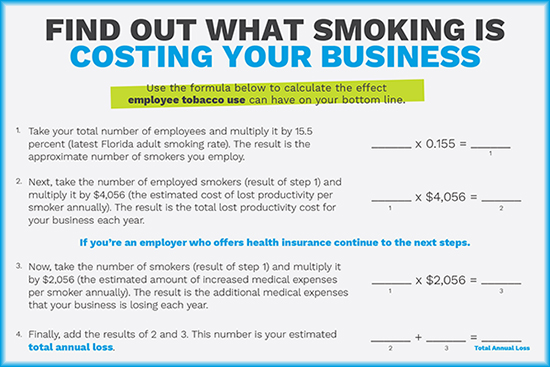News and Events
DeSoto County Chamber of Commerce Adopts a Tobacco Free Worksite Policy
November 20, 2018
Our Partnership is excited to announce that the DeSoto County Chamber Board recently voted to adopt a tobacco free workplace policy, supporting their employees and visitors, and enhancing their wellness policy. The tobacco-free policy includes all Chamber properties. In addition to the worksite policy, the Chamber has also adopted a Tobacco Free Events Policy, which prohibits tobacco use at all events hosted by the DeSoto County Chamber of Commerce. The Tobacco Free Partnership was also pleased to present the Chamber with free signage to help relay and enforce their new tobacco free policy.

Pictured (left to right): Pam Vowels - DeSoto County Chamber President, Debbie Wertz - DeSoto County Chamber Director, and Jodie DeLoach - Community Health Advocate.
The Tobacco Free Partnership of DeSoto County works diligently to help businesses create tobacco free environments for its employees and visitors. Tobacco-free policies have many benefits, but most importantly, they help young people realize that tobacco use is not a "normal" adult behavior... an attitude that the tobacco industry has marketed for years.
One of the primary reasons an employer chooses to adopt a tobacco free workplace is the high cost associated with tobacco use at work. While it is common knowledge that smoking is bad for the smoker, not many consider the effect this addiction has on local businesses. In Florida alone, the annual direct costs to the economy attributable to smoking exceed of $19.6 billion, including: workplace productivity losses of $4.4 billion; premature death losses of $7.9 billion; and direct medical expenditures of $7.2 billion (1). Between both the additional healthcare costs and losses in productivity, an employee who smokes could cost a business more than $6,000 every year (2). For each employee that quits, a business can save as much as $2,000 per year through reduced insurance cost (3).

Smoking remains the leading cause of preventable disease and death in Florida and the United States (4). On average, smokers die 10 years earlier than nonsmokers (5). Smoking can also cost individuals a lot more than just their health. A pack-a-day smoker in Florida can spend more than $2,000 in just one year and more than $10,000 in five years on cigarettes.
Tobacco free worksites protect employees from the harmful effects of secondhand smoke, encourage current tobacco users to reduce their use, and help those who are trying to quit. This gives employers the opportunity to reduce the negative impact of tobacco on their employees and their business.
Tobacco Free Florida’s Quit Your Way program makes it easier than ever for tobacco users to access evidence-based, free tools and services to help them quit tobacco. For more information, please visit tobaccofreeflorida.com/quityourway.
For more information about adopting a tobacco free workplace, visit www-tfp-desoto.org or contact Jodie DeLoach at jdeloach@quitdoc.com. To learn more about the Quit Your Way program, visit TobaccoFreeFlorida.com/QuitYourWay.
____________________________________________________________________
References:
- Penn State. “Potential Costs and Benefits of Smoking Cessation for Florida.” 30 April 2010. Web. 1 March 2011.http://www.lungusa.org/stop-smoking/tobacco-control-advocacy/reports-resources/cessation-economic-benefits/reports/SmokingCessationTheEconomicBenefits.pdf.
- Berman, Micah, Crane, Rob, Seiber, Eric, Munur, Mehmet. Estimating the cost of a smoking employee. British Medical Journal. 2014;176(12):1792-1798. doi:10.1001/jamainternmed.2016.6530.
- Berman, Micah, Crane, Rob, Seiber, Eric, Munur, Mehmet. Estimating the cost of a smoking employee. British Medical Journal. 2014;176(12):1792-1798. doi:10.1001/jamainternmed.2016.6530.
- U.S. Department of Health and Human Services. The Health Consequences of Smoking—50 Years of Progress: A Report of the Surgeon General. Atlanta: U.S. Department of Health and Human Services, Centers for Disease Control and Prevention, National Center for Chronic Disease Prevention and Health Promotion, Office on Smoking and Health, 2014.
- Jha P, Ramasundarahettige C, Landsman V, et al. 21st Century Hazards of Smoking and Benefits of Cessation in the United States. New England Journal of Medicine 2013;368:341–50 [accessed 2017 Mar 28].


